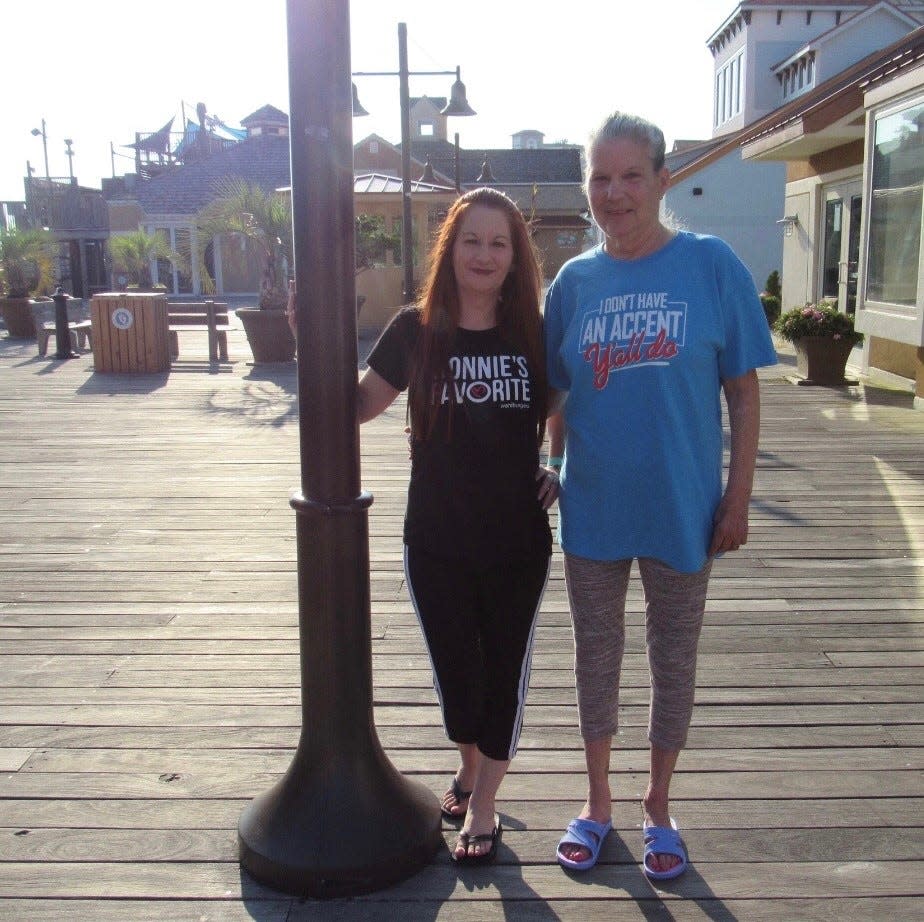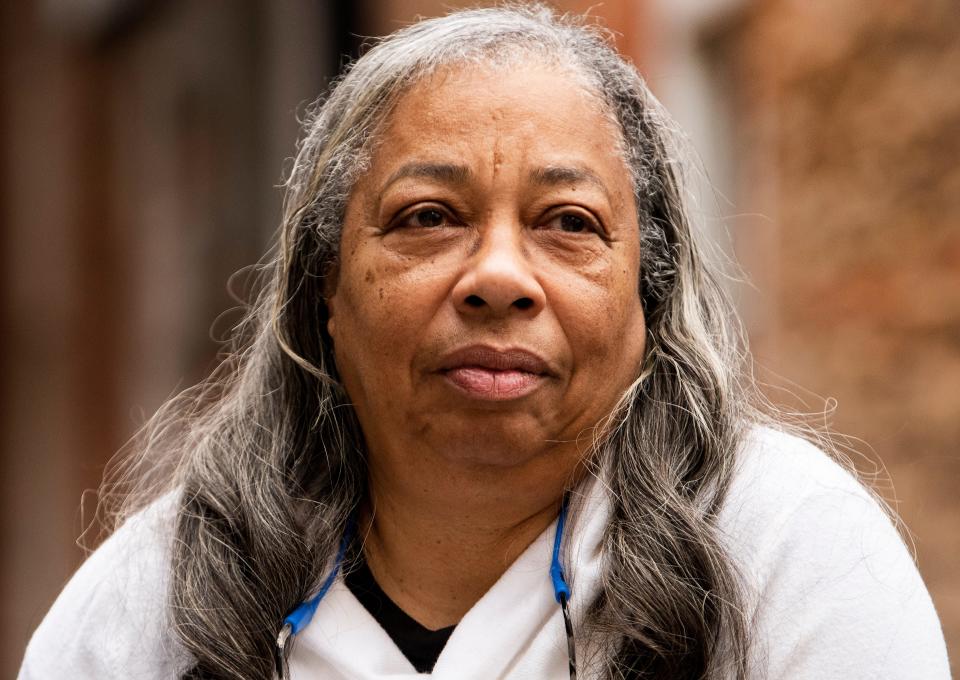'Send me some more hands': The struggle of caring for parents with Alzheimer's
This is Part 1 in a series about the arduous tasks of aging and caregiving in Alabama. This story was produced with support from Columbia University’s Age Boom Academy.
Gina Pullum-Smith found herself praying at an intersection in Montgomery early last year.
“God, I’m tired,” she remembers saying. “Can you send me some more hands?”
She had been her mother’s caregiver for over 17 years, and it depleted her of any energy. She loved her mother dearly, but the responsibility of keeping her mother alive, healthy and happy was heavy.
Jeanette, her mother, suffered from dementia, and Pullum-Smith had tried everything to help her from the moment the family realized something was wrong.

Part 2:Elder abuse reports are up in Alabama. Here's what investigator Amy Floyd does about them.
Part 3:Aging in rural Alabama: Family has give-and-take approach to eldercare
Almost two decades ago, Jeanette bought a one-way ticket to Iowa to visit her son — even though she would inevitably return to her home in Chicago, and round-trip tickets were plenty cheaper.
Jeanette’s children knew her to be a frugal woman, so that was the first sign of a problem. Still, it took a little while longer for the Alzheimer’s diagnosis to come, and it took even longer before Pullum-Smith realized that no other family members were in the position to help with her mother's care.
Shortly thereafter, Pullum-Smith moved her mother into her home in Montgomery, and they began searching for the best way to manage her disease. The solutions they tried included moving Jeanette into a neighboring house with a caregiver, testing out long-term care facilities and making plenty of trips to the doctor.
A few days after Pullum-Smith stopped at that intersection to pray, she ran into a professional caretaker who had helped with her mother years before. The woman had just stopped care for a client and wanted to know if Pullum-Smith needed her again.
“I said, ‘Yes, I do. Thank you,’ and she was with me until the day my mom died,” Pullum-Smith said.
The ins and outs of Alzheimer’s
While dementia is a general term for memory and judgment loss, Alzheimer’s is a specific disease that first affects the part of the brain that is associated with learning, and it manifests as symptoms of dementia that worsen over time.
More than 6 million Americans have Alzheimer’s today, and just over 10% of people above the age of 65 are diagnosed with the disease, according to the Alzheimer’s Association. Women are more likely to get Alzheimer’s than men, but that is mainly because women tend to live longer, according to a Harvard Health Publishing article.
Also, older Black adults are nearly twice as likely to develop the disease than older, white adults. This could be because of genetics, socioeconomic factors, stress levels or something else entirely, according to a Lancaster General Health article.
Scientists don’t yet fully understand what causes the disease in most people, but risk factors include age, family history, heart disease and high blood pressure.
‘The long goodbye’
In the caregiving world and among the friends and families of loved ones who are diagnosed, the disease is commonly referred to as “the long goodbye.” As cognitive abilities decline, the person slowly slips away, coming back to themselves in moments that dissipate quickly.
“Alzheimer's is watching a video of your life reverse. The things that they share and talk about, you could have never heard before,” Alzheimer’s education and research specialist Nancy McLain said. “You get to see not who they are now, but you get to see who they have been all their lives.”
McLain is one of the coordinators for the Alzheimer’s and dementia support group that Pullum-Smith began attending years ago. The group meets once a month in Frazer Church to talk about their situations, hear from experts and spend time with other caregivers, people who are experiencing challenges like their own.
McLain has been working with individuals and families affected by Alzheimer’s for most of her adult life, and in 2002, she helped organize Alzheimer’s Education, Resources and Services, a nonprofit in Alabama dedicated to Alzheimer’s caregivers.
Oftentimes, she said caregivers will feel guilty thinking about life outside of the loved ones they take care of, but when they are around each other, that guilt can fade, if only temporarily.
“It’s important for them to have a good support system,” McLain said. “You’ve got to laugh to keep from crying. It’s important for them to know there is life after this.”
Managing expectations
Like many of the caregivers who attend the support group, Kim Mayton has to bring a sitter in to watch her mother while she spends a few hours at the church.
She has been her mother’s full-time caregiver for four years and legally responsible for her longer than that. Still, she says it hasn’t gotten any easier.

Four years ago, Mayton quit her job to stay home with her mother. The home care company she was using cost $17.95 an hour, and full-time, that ran through their money pretty quickly. Now, they’re on the Veterans Affairs Caregivers Assistance Program. Mayton's mother is a veteran, so the VA provides health insurance and pays Mayton to take care of her.
“I didn’t feel like I had a choice,” she said.
Most of the time, Mayton’s mother can't dress herself, bathe herself or go to the bathroom by herself. She needs assistance to do anything, unless she’s not supposed to be doing it. In recent years, her mother has stripped naked, wandered around the neighborhood and locked herself in her closet.
Sometimes her mother will suddenly become paranoid and fearful that Mayton is going to kick her out of the house. That has never happened.
“One day I saw in one of my Facebook dementia support groups, somebody said that they weren't made for this, that they can't do this. And I know everybody's different, but I kind of took offense. I wasn't made for this. I didn’t expect this either. None of us did,” Mayton said. “I had to become responsible for her when I was 37. I mean, this isn't what I thought my life would be like.”

Still, Mayton finds joy in going to New Kids on the Block concerts, getting her hair done and taking time away to go to the support group. She looks forward to her respite — the hours of sitter services she gets through Alabama Cares and the five-day period every 60 days when her mom goes into a facility that comes with her hospice care.
It's not a lot, she says, but it’s something to get by on.
Changing plans
Pullum-Smith still attends the monthly support group, even though her mother died in July of 2022.
“That support group helped me a lot. There were days that I would just break down and cry. I didn't know what I was doing. The support group was there to help and to know that other people are going through similar situations. That way, you don't feel like you're just a strange duck,” she said. “I still go because I know things I can share.”

She knows that people should take away their loved one’s car keys sooner than they think and that all knives should be behind a lock and key. She knows the importance of having a will, a living will, a power of attorney and a trust all in place. She knows that the Montgomery County Sheriff’s Office operates Project Lifesaver, offering free GPS tracking watches that you can give loved ones so they don't get lost.
She also knows when it’s time to let go.
Jeanette had two notable visits to the emergency room toward the end of her life. After the first, which was due to blood clots in the lungs, Pullum-Smith said her mom was so happy that “you would’ve thought she was at a spa." After the second, which was initially caused by dehydration, Jeanette had to go to a rehabilitation facility.
Pullum-Smith visited her every single day for weeks until the last four. A few residents tested positive for COVID, so the facility closed itself off from visitors during the last several days of Jeanette's stay.
“By the time we came back to pick her up on that Thursday, something had shifted. She wasn’t the same. I don’t know if she thought I wasn’t coming back to get her. I don’t know what happened,” Pullum-Smith said.
From that day in June until her death in July, Pullum-Smith said Jeanette just stayed in bed. She was so weak she couldn’t even hold a soda can.
Pullum-Smith thought she would be afraid to be in the room with her mother when she died, but she wasn’t. She said it’s different when you’re with someone you love.
“We’re selfish. We want to keep the people we love alive, but you don’t want to keep somebody in bad health. Because then they’re suffering,” she said. “The thing that we’re afraid of is death, but we die the moment we’re born. Death is just part of the life cycle.”
More resources
AERS has videos, books, support groups and other free resources available to caregivers. The nonprofit also offers training, respite and day care programs. To reach AERS, call (334)233-2139 or send a message on its website.
Alabama Cares also offers support for caregivers, including training, counseling, support groups and supplemental services. These resources are available to primary family caregivers of frail, older adults aged 60 or older, and older caregivers for children relatives aged 18 and younger with or without disabilities. Contact your local Area Agency on Aging and Disability Resource Center at 1-800-243-5463 or visit alabamaageline.gov.
Hadley Hitson covers the rural South for the Montgomery Advertiser and Report for America. She can be reached at hhitson@gannett.com. To support her work, subscribe to the Advertiser or donate to Report for America.
This article originally appeared on Montgomery Advertiser: What Alabama caregivers know about helping parents with Alzheimer's

